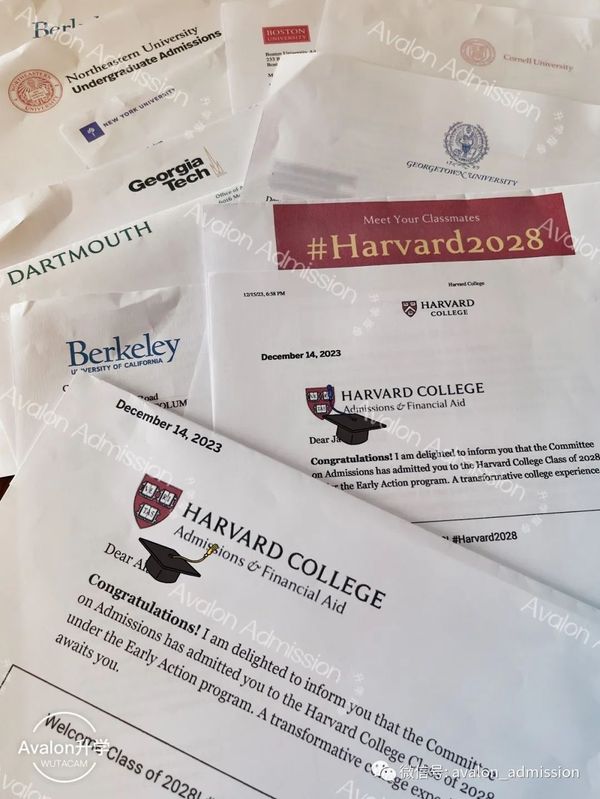The Secret to Elite College Admission Success
Making Smart Decisions
Make it Happen

We Help Students Make Elite Admission Happen
40 Years of Success
The most exciting, important, and challenging phase of your academic career is just around the corner—applying to colleges. In a perfect world, getting into college would simply be granted for all your years of hard work and sacrifice. In reality, however, getting into top-choice colleges is a highly orchestrated and strategic process that more resembles art than science. Not only must you have good grades and great test scores, but you must also be smart, organized, and strategic throughout the process.
We understand how hard you have labored. But colleges don't consider that your GPA results from thousands of hours of work, that every accomplishment came with a truckload of determination, that all the moments of glory arose from endless hours of practice, or that your challenges were met with grit, fortitude, patience, and persistence. They don't consider how many times you stayed up all night to complete a project, or the countless hours you spent at the school newspaper office, theatre, athletic field, or gymnasium.
And yet for all that work and all those hours of studying, the resultant objective factors such as GPA, honors, and awards only get your foot in the door. To be accepted, you must not only have the data, but also the supporting cast of accomplishments, activities, experiences, interview skills, recommendations, essays, and awards, blended together into a unique positioning statement that will allow your application to shine. Throughout your remaining time in high school, we look forward to guiding you through the process of communicating your story effectively and efficiently. As we do, we will rely on the expertise we have garnered through our work with thousands of students over 40+ years, and the critical insights that only you can provide.
Some Great Tips:

1. Understand the eight elements of character and make important decisions that enhance your character profile. The eight elements are compassion, curiosity, gratitude, grit, growth mindset, perspective-taking, purpose, and self-control*
- Show kindness and compassion to people, especially people who are not the same as you.
- Undertake activities that nurture your passion but also that help people, and the world.
- Be bold in the choices that you make, such as the activities and classes you choose.
- Do things not because they are easy or comfortable, but because they challenge you.
- Write essays that demonstrate the depth of your character, rather than highlight your accomplishments.
*From Making Caring Common; Harvard Graduate School of Education

2. It is important to recognize that admission officers will not be blind to who you are and the challenges you have faced due to your circumstances. For example:
- If you are a first-generation college student, that will continue to work in your favor.
- If you live in a neighborhood or a region that is traditionally underrepresented, that will still work in your favor.
- If you have had to contribute to the well-being of your family, either financially or with your time (for example preparing dinner for your brother or sister while your parent worked), that will still be considered.

3. Try to see things from a global perspective. Understand the world beyond your town and your school. Write about issues that impact the entire world, not just your own background, race, religion, or heritage.
- Colleges prefer students who see the big picture, not just the world outside their door or inside their school. Try to write about things that have larger significance to the world as a whole.
- Conducting significant research that culminates in a paper or presentation serves as a validator of your interest in significant areas such as climate, biological research, history, or virtually anything else in which you have demonstrated a propensity.
Read More:
- Five Ways to Get into Your Top Choice Colleges
- Seven Critical Mistakes to Avoid in High School if Your Goal is Admission to Top-Ranked Colleges
- 21 Suggestions for Students Planning to Apply to Top Colleges
- If You Want to Get into a Top College, Keep Your Eyes Far Down the Road
- The Key to Harvard Admission Success
- In College Admissions, What You Don’t Know Can Hurt Your Chances
- Applying to Highly Competitive Colleges? You Must Stand Out
- Applying to Elite Colleges? Prove Your Passion
- The Key to Ivy League Admission

How to Build Your College List
A college list should be more than merely a list of familiar names. Each and every one of the schools on your list should be one where you would feel comfortable attending. Of course, you would prefer to go to a “reach school,” which is defined as one where your chance of being rejected is higher than your chance of being accepted. However, you should be comfortable with every school on your list. It makes no sense to apply to a school that you know you will not go to or be happy at. In terms of what makes you happy, that is a deep and broad discussion that is covered in some of the articles found on this page. There are many factors that should go into your choice of which schools make your list. These factors include geography, size, student culture, orientation (liberal arts or university, for example), choice of majors, cost, affiliations, research opportunities, study abroad opportunities, and campus life.
A college list does not have to be symmetrical, containing the same number of reaches, targets, and safeties. On the contrary, a well thought out list should have only a few safeties since a safety school is one that you are likely to get into but don’t want to go to. So, while a couple safeties is a good idea, anything more than that is simply a waste of space.
Read More:
- Free Avalon College List Generator with "What If" Engine
- Creating the Perfect College List (Part One) Asymmetric Symmetry
- Creating the Perfect College List (Part Two): Important Factors in Forming College Lists
- Creating the Perfect College List (Part Three): Choosing Colleges Based on Your Priorities
- How to Create Your College List

Your College Admission Narrative
Not to be confused with the personal narrative essay on the Common Application, your college admission narrative is the story of you as you choose to be seen by college admission committees. It is the glossiest possible portrait of yourself, including all your myriad accomplishments, admirable traits, significant experiences, and life story. It can even include your greatest obstacles and challenges. Your personal narrative includes elements of your past, present, and future. It is about what motivates you and why. It is about connecting your past experiences, both successful and unsuccessful, with your hopes, dreams, and aspirations for the future. It is about your family, your friends, your activities, and the things you choose to do in your spare time. It is about the choices you make, the people you associate with, and the fervor with which you pursue your interests.
Another way of thinking about the narrative is that it is the story that is told about you when the admission team is considering your application. It takes over at the point when objective factors have already been considered and now it is time to understand the personal aspects of your story. At Avalon Admission, we craft essays that are authentic, admirable, formidable, and compelling. We do so in a way that turns heads in your favor without bluster, exaggeration, or overly puffed-up language. Most important, for students who have worked with us over an extended period, we have already been building the narrative for years by helping them make all the right decisions at all the right times and providing them with stellar opportunities as well. Then, we tell the story of your accomplishments, your choices, your challenges, your beliefs, and the ways in which you are likely to make a positive contribution to the college community and campus culture.
Read More:
How Character and Writing Ability Can Improve Your Odds of College Admission
In College Admissions, What You Don’t Know Can Hurt Your Chances

How Important are GPA and Academic Rigor in College Admission
GPA and level of academic rigor (the extent to which you challenge yourself by taking higher level classes such as honors and AP) are among the most important factors considered by virtually every college in the admission process. No controversy here, unlike some other factors such as test scores, race, and legacy—all of which have been subjects of significant scrutiny and debate.
There is nearly universal acceptance that GPA is a solid indicator of academic success as demonstrated over an entire high school career and conveys important information that may directly correlate with a student’s success in college. Rigor is the “B-side” of the equation because it serves as an indicator of a student willingness to challenge themselves and success in taking classes that approach difficulty levels found in first year college courses.
Weighted or Unweighted GPA
Typically, colleges consider only unweighted GPA’s, meaning a pure 4.0 scale with no additional consideration for honors or AP level courses. However, they do consider rigor as well. Some high school schools use a 4.3 or 4.5 “unweighted” scale, with an additional fraction of a point given for + grades such as A+ or B+. IB, or international baccalaureate high schools use a 1 to 7 grading scale, and other schools make up their own grading scale. Colleges are aware of this and make school-specific adjustments, so don’t worry if your school does not use a traditional 4.0 GPA scale.
Read More:

How Many AP Classes Should Students Take to be Strong Candidates for Top Colleges?
With respect to college admission, the short answer to this question is, “as many as possible.” AP classes and tests in which students score a 4 or 5 (on a scale of 1-5) provide proof to colleges that students can handle the rigors of college level-academics. This is important because colleges do not want to admit students who are not able to handle the workload.
Colleges tend to gravitate towards students who are not afraid to challenge themselves, and AP classes represent the ultimate academic high school challenge. Furthermore, a strong performance on AP tests proves a student’s ability to absorb or memorize large amounts of information, since AP classes tend to provide overviews of subjects rather than detailed analysis or interpretation. In this way, they are similar to entry level classes taken by college freshman.
It is worth noting that colleges are aware of the level of each high school’s academic rigor, including the number of AP classes offered. Students coming from high schools that do not offer AP classes will not be penalized for not taking AP classes or tests. Students are evaluated on the extent to which they take advantage of opportunities offered by the school, as well as on the nature of opportunities they make for themselves in the form of extracurricular activities.
One final note about AP exams: for students who are not submitting SAT or ACT scores, results from AP exams and grades from AP level courses will take on greater significance. The reason for this is clear; when students provide fewer metrics for analysis, each data point they do provide becomes magnified. This applies not only to the rigor of a student’s course load and results of AP tests, but also to academic honors, extracurricular activities, and recommendations.
Which is Better: An A in College-Prep Level or a B in Honors or AP?
Of course, the best of all worlds is earning an A in Honors or AP. Otherwise, there are other things to consider when entering this question, such as whether a course is directly related to a student’s anticipated college major, what is the student’s overall GPA and level of academic rigor, and other individual factors. For example, a recruitable student athlete might want to demonstrate a willingness to challenge themselves by taking an AP course and getting a B, rather than taking an easier course and getting an A.

With So Many Test-Optional Colleges, Are SAT and ACT Scores Still Important?
Yes, test scores remain an essential factor in college admission. In fact, test scores are among the top three factors considered by most admission committees, along with grades and strength of curriculum. The truth is that when all other admission factors are in place, test scores can get you in or they can keep you out. If your scores are low, then you should consider not submitting them. If they are roughly equal to or better than your grades, you should definitely submit them. The only question you must ask yourself is, “Will submitting test scores strengthen or weaken my application?”
Which of the Top Colleges Still Require ACT or SAT
Read:
It was nice while it lasted, wasn’t it? In retrospect, the thought of not having to do all that test preparation and still have hopes of admission to your dream college seems too good to have been true. Alas, the era of test-optional admissions is coming to an end—but only for some colleges. We had already seen a trickle, a crack in the foundation, of our house of cards. Without tests, something was always missing – some objective measure of a student’s likelihood of college success to balance off the completely subjective 4.0 grading scale that differed from school to school as much as the highest mountain peak in the Andes differs from the highest peak in the Adirondacks.
Prompted by Covid restrictions beginning in 2020, nearly 2000 colleges across the US became test optional virtually overnight. But one by one they started to come back, fearing that the lack of data would cause them to make serious mistakes in the admission recruiting process. One of the first re-adopters was Georgetown. It was quickly followed by MIT, Georgia Tech, all the Florida public colleges, the US Naval Academy, the US Military Academy, and more recently, Dartmouth College and Yale University. Harvard and most other Ivy League colleges will follow soon. Then, the country will be a checkerboard of colleges that require ACT or SAT, and those that don’t. And even though the University of California system has said they are permanently test optional, they have also stated many times that they will be developing their own standardized tests.
Anyway, I have a bit of a different point of view on testing, having spent most of my professional life developing strategies, writing books, and training students are these tests. I believe that dreams take hard work to achieve, and learning to take tests is part of that process. I also believe that both SAT and ACT provide useful information to colleges, especially when combined with other factors such as GPA, academic rigor, recommendations, extracurricular activities, essays, research, AP tests, and a few others. SAT and ACT may not be panaceas, but they are useful tools that colleges can and should use when making their admission decisions. As much as you may not like them, you must admit that a student who scores in the lower 10% will have a difficult time succeeding at a highly competitive college, and a student who scored in the top 10% is far more likely to be able to meet the challenge of college-level courses. Indeed, these findings have proven consistent over multiple case studies.
In mid-February 2024, Dartmouth announced its intention to once again require tests. Yale followed suit a few days after. Now, the only thing preventing Harvard from being the next shoe to drop is the fact that it has become a lightning rod of controversy over the past year and does not want to make a rash decision that it will later regret. But it is just a matter of time until Harvard joins the herd of colleges that are jumping of the test-optional bandwagon. Harvard has long been an advocate of the SAT (and ACT) because it provides a wealth of information in a very succinct manner that does not require deep analysis. Indeed, the SAT was first created by and for Harvard College as a way of maintaining the meritocracy inherent in its admission process. But I digress.
Columbia has indicated that it is permanently test optional. The same goes for the University of California system. We shall see. I do believe that some of the less competitive colleges will continue to be test optional, or test blind, maybe forever. But as for the nation’s most competitive colleges, expect more and more of them to make the announcement that will make many high school students’ hearts sink to the floor: “We will be requiring standardized tests once again beginning next year.”
The current list of top colleges that require ACT or SAT scores is relatively small and is included below. However, the list of colleges that will accept ACT or SAT scores is significant and includes most major colleges other than those in the University of California system.
List of Top Colleges that require SAT or ACT scores:
Dartmouth
Georgetown
Georgia Tech
MIT
United States Air Force Academy
United States Military Academy
United States Naval Academy
University of Florida
University of Georgia
Yale
List of Top Colleges that DO NOT Consider SAT or ACT Scores
Caltech
Pomona
Dickinson
Hampshire
Pitzer
Reed
University of California (all campuses)
California State Colleges (all campuses)
Worcester Polytechnic Institute (WPI)
Read More:
Does Test Optional Admissions Hurt My Chances?
What Are the Pros and Cons of Taking the ACT Writing Test?
Test Optional Is Not Test Blind
How Important are SAT, ACT, and Other Test Scores?
Four Important Questions about Test Scores and College Applications

What are the Best Summer Activities for College Applications?
The popular myth about summer activities is that they must be big-name programs like Harvard, Stanford, Wharton, or Georgetown. The truth is that colleges really don’t care about the name of the program. They care about how you choose to spend your free time and how well you take advantage of the opportunities that you are given. The best summer activities are the ones that support your case for admission. For example, if you intend to list psychology as your intended major, then colleges will want to see that you have attended a summer program (or an internship pr research study) related to psychology. They will also want to see that you have taken psychology in school, and possibly a course outside of school. So, instead of thinking that you must load up your application with big-name programs, think instead about creating a consistent set of activities that validates your college profile.
Why are so many rising 12th graders, who are candidates for admission to elite colleges and universities, suddenly lamenting choices they have made over the past three years? Perhaps they wish they had gotten that summer job, or that they had put themselves in a better position to request a stellar recommendation from their teachers. Perhaps they regret not taking more honors or AP classes, or not studying more for tests. Perhaps they regret not demonstrating their writing ability and passion by authoring a few articles or proving their affinity for astronomy by acquiring telescope time at a local observatory. Perhaps they now question why they did not spend more time identifying possible internships, or volunteering at the Stone Zoo, or helping at the Boys and Girls Club, or teaching tennis through Tenacity in Boston.
It is understandable, even admirable, to reevaluate one’s own choices in life. But why is the summer before 12th grade the first time that so many top college hopefuls are questioning their college-related actions of the past three years? Because, in many cases, this is when students are hearing about gaps in their application for the first time, through articles on the Internet, from their school counselors, or from private counselors such as myself. This is especially true of high-achieving students who may have felt that their GPAs and test scores, coupled with significant community service hours and expertise in a musical instrument, were enough to get them into Harvard or MIT. Much to their chagrin, they are now learning that these accomplishments, impressive as they are, are just a starting point at elite colleges and universities.
With an acceptance percentage of between 5% and 10% at top colleges, only one student is accepted for each 10 to 20 who apply. Equally daunting is the fact that virtually every other candidate has high GPAs, high test scores, and other impressive attributes. Throughout their first three years of high school, many students believe that all they must do is work hard in school and study for tests, and top colleges will come knocking at their doors. However, they are now finding out that every moment of a student’s time, from 9th grade through the first half of 12th grade, is tracked, evaluated, and judged. They are finding out that the difference between acceptance and rejection for top students at highly ranked colleges can be as simple as the way that a college application assembles three-and-a-half years of activities, the choice of adjectives used by teachers in their recommendations, the level of classes taken, or how a student responds to a college’s supplemental essay question. Of course, for rising seniors, most of these factors are already locked in place. “If only I had known,” they say. “If only I had known.”
So, for all the rising 9th graders, 10th graders, and 11th graders, and parents reading this article, heed the lessons of those who have come before you. Plan your strategy for college beginning in ninth grade. Identify your passion, then prove it with your choices. Show how much you care about the world around you by doing something to improve it. Show teachers how much you deserve stellar recommendations by being a model student, a class leader, and a positive influence in the classroom. But these are just a few ideas and there are literally hundreds more. No one activity is necessarily better than another. Each one choice is a building block to a stronger application. Furthermore, don't engage in activities just to fill up the 10 spaces on the common application. Colleges would much rather see quality than quantity. They would like to see longevity of commitment, rather than an accumulation of short, random activities.
In closing, I would just say that you should use your sixth sense to tell yourself this is the right activity for you. If it feels right, then it probably is. If you are truly interested in something, then pursue activities that are related to things you are passionate about. Pursue them to a meaningful conclusion, to an advantageous outcome. Always strive to be the best person you can possibly be, to help others, and to help yourself along the way. Don't let any opportunity pass you by, or you'll find yourself in the same position as these rising 12th graders who now find themselves wondering why they didn't do more during their previous three years.
Read More:
What are the Five Best and Worst High School Activities for College Applications?
21 Suggestions for Students Planning to Apply to Top Colleges
Applying to Elite Colleges? Prove Your Passion
The Five Critical Characteristics of a Successful Internship
The Activities Section of College Applications
How Important To College Admission Are Research-Related Activities?

How Important are Teacher, Counselor, and “Other” Recommendations
One of the most important and underrated parts of a student’s college application is the recommendation section. To colleges, the information provided by unbiased individuals such as teachers, counselors, and coaches is pure gold. Written correctly, recommendations provide personal insights into a student’s characteristics, which has the potential to add significant depth to each student’s application. For students with extremely high GPAs and test scores who are competing for spots at elite colleges, recommendations serve as differentiators that allow students to stand out from a strong and crowded field. For students with less-than-stellar academic records, recommendations can provide information that either explains away a lower GPA or provides additional information that may allow colleges to overlook relative weakness in academic performance. In either case, character means a lot in the admissions game, and recommendations are the best way to showcase these important, though non-objective, characteristics.
Many schools allow students (and their parents) the opportunity to provide information that they feel might be useful to a teacher or counselor in writing a recommendation. These are often referred to as brag sheets or recommender forms. If you are not sure if your school has these forms, be sure to ask your counselor. These forms should be completed before the end of junior year which is also the time you should be asking your teachers for recommendations. Neither of these activities should wait until junior year or summer or senior year, unless specifically indicated by your school. Furthermore, these forms should be filled out completely, skillfully, and thoughtfully. After all, if you don’t take the time to help your teacher or counselor understand your perspective, why should they care enough to take the time to write you a meaningful and thoughtful recommendation?
The truth is that teachers rarely write bad recommendations. They always have something good to say – which is part of the problem. If all recommendations are good, then how likely is it that a good recommendation will help you move the needle toward acceptance? The truth is that a good recommendation is not going to help you; a great recommendation is! The difference between a good recommendation and a great recommendation can only be measured in light years. Therefore, taking all necessary steps to earn, yes earn, a great recommendation is well worth the effort. Most colleges accept two teacher recommendations,
a counselor recommendation, and an “other” recommendation from a coach, community leader, or other person outside of school. This varies a bit from college to college, in that sme colleges do not accept any other recommendations and some take two or more. Almost all colleges allow you to submit two teacher recommendations and one counselor recommendation.
Teacher Recommendations
In most cases, teacher recommendations are written by 11th grade teachers. However, this is not a steadfast rule. In some cases, 10th grade teachers may have greater insights into a student’s personality or other characteristics and may serve as better recommenders. The choice of who serves as a recommender is typically yours, as long as the teacher agrees to be a recommender. In most cases, colleges prefer one recommendation from a STEM subject teacher and one from a humanities subject teacher. Some colleges, mainly technical and engineering oriented schools, prefer the two recommendations to be from either math or science teachers. In general, teacher recommendations tend to go beyond your academic ability to discuss things like your participation in class, your attitude, your class leadership, your classroom demeanor, and some aspects of your personality. In cases where teachers know you outside the classroom either through activities or through discussions you may have had, they are likely to speak about positive characteristics such as your commitment to helping the community, your passion for a particular subject or interest, your maturity, and your likelihood to be successful in a competitive college environment.
Earning stellar teacher recommendations is a process. Each one should be carefully curated over one to two years of shared experienced between you and your teacher. The process of curating stellar recommendations begins the first time you meet a teacher. You should make a strong first impression and continue to be an impressive and important presence in the classroom. You should offer to be a leader when the opportunity arises. You should always do more than is asked. You should make it a point to help students who may be struggling to understand certain aspects of the class, either during or outside of class time. You should make a regular effort to see the teacher during office hours, if only to discuss the subject and not necessarily to get extra help. Remember, teachers are passionate about the subject they teach and are more likely to write stellar recommendations for students who share their passion.
If your teacher recommenders are unaware of your external activities, you should consider providing them with a copy of your résumé. If you don’t have a résumé, you should create one. The resume should include the classes that you’ve taken, the test that you’ve taken, your activities inside and outside of school, and any awards or honors you have received.
Counselor Recommendations
Counselor recommendations tend to be more factual in nature simply because students rarely spend much time with their counselors. As a result, counselors depend heavily on the information that you provide them with. If possible, you should plan to spend some time with your counselor during sophomore and junior year, and not wait until senior year to introduce yourself. The statistics here are pretty telling. According to NACAC (the National Association of College Admission Counseling), the average college counselor spends 45 minutes in total with each student during his/her four years of high school. That is approximately 11 minutes per year, or just over one minute per month. That is not enough time to get to know a student. However, you may request additional time with your counselor to ask questions about how to best prepare for the college admission process. Not only will the information provided tend to help you, it will also help you build the basis for a stronger recommendation from your counselor.
Other Recommendations
Other recommendations typically come from professional people who know you outside of academic time at your school. It could, however, be a sporting coach, a music coach, an art teacher, or a performing arts director. It could also be someone you work with outside of school such as a personal trainer, an art teacher, or a music teacher. It could also be someone for whom you interned, someone you worked for, or someone who knows you in another non-academic capacity. Typically, other recommendations are submitted through the Common Application (except for schools that do not use the common application), though sometimes they can be submitted directly to the college admission office. This is tricky business and should not be done unless the college has directed you to do so. Often, you have more control over another recommendation than either your teacher or counselor recommendations. This is because people who serve as other recommenders are usually more willing to provide information that you deem to be important to your admission candidacy. For this reason, other recommendations should be more personality oriented. For example, they might mention how hard you work, how much you care about quality, how you handle constructive criticism, how well you work in a team, or how talented you are in a particular field. They might also speak to your potential to excel in a particular realm.
In all cases and for all types of recommendations, it is fundamentally important for recommenders to paint you in the most positive light possible. They should speak to your excellence, not your competence. They should speak to your potential to be among the best, rather than your ability to keep up with the rest. The holy grail of recommendations are those that indicate that you are one of the best that the recommender has ever had the opportunity to work with. That kind of wording will move the needle more than you can possibly imagine!
Read More:
Five Facts About Recommendations for College
How Important are “Other Recommendations” for College Admission?

What is Demonstrated Interest and How Important Is It?
Demonstrated interest is the process by which students display their interest in a particular college by engaging in activities that then become known to the college’s admission committee. Two things are important here. First, there are several different ways to demonstrate interest. Second, not all colleges track demonstrated interest. Those that do vary in the degree to which they consider demonstrated interest as a factor in their admission decisions. Some colleges considered demonstrated interest to be extremely important and weigh it heavily in their decisions, while others consider to be a minor factor. Statistically, approximately 70% of all colleges do consider demonstrated interest to some degree, while 30% do not track it at all. Even colleges that say they do not track it are aware if their candidates have made certain efforts to get to know the campus, such as scheduling a live or virtual visit, applying through one of the colleges early programs such as early action (EA), or early decision (ED), responding to emails and visiting websites, or checking out social media sites. For some students, there are other options as well such as connecting with coaches, department heads, professors, or campus-based academic or social institutes.
Read More
The Importance of Demonstrated Interest and ED in College Admission

How to Write Winning College Application Essays
There are two types of the college essays to consider: the Common App or “Personal Narrative” and each college’s supplemental essays. Note: not all colleges require supplemental essays, but for those that do your responses are critically important. The Common App essay can be up to 650 words in length, while the supplemental writing assignments can be anywhere from a few words to a few pages. Please note that college essays are not typical writing assignments that can be entrusted to someone with no or little college admission experience. They require the dedicated efforts of students working under the guidance of college admission experts.
The Common App Essay is a vital part of a student’s application. It is taken very seriously by admissions committees and, for a student on the bubble, can even mean the difference between acceptance or rejection. Not only must the Common App essay be well written, error-free, and on topic, it must provide insights into a student’s personality, priorities, history, maturity, resiliency, accomplishments, or way of thinking.
Admissions officers read thousands upon thousands of application essays each year. By giving them something in your essay to appreciate or even get excited about, you can help make their task easier and simultaneously make your outcome more favorable. Your essay must have a unique quality to it and it must present a colorful, attractive picture of you as a potential member of a school’s student body and academic landscape. The adage “show, don’t tell” definitely applies to the Common App essay. As such, you must identify topics, provide examples, or include anecdotes that highlight your strongest attributes whether they are character traits, experiences, or accomplishments.
Answering all types of supplemental questions expertly and strategically is every bit as important, or even more important, then the Common App personal essay. Done well, they can breathe life into each college’s application. Done carelessly, they can cause an application to fall flat. In all cases, college essays should be sparkling pieces of prose that provide insights into a student’s personality and highlight a student’s special characteristics. Keep in mind, however, that the most important attributes that should come across in college essays are honesty, integrity, admirability, and likeability. Therefore, they should not be over the top, overly metaphoric, or overly polished.
Read More:
How Important are College Supplemental Essays?
How to Ace College Supplemental Essays
What Are the Components of a Successful College Application? Part One: The Essays
Your College Application Essays Should Demonstrate These Five Characteristics
New Harvard Application Responds to Supreme Court Decision with Five New Essay Prompts
Why are Colleges Trending Toward Shorter Supplemental Essays?
Guidelines for College Research Prior to Writing Essays and Going on Interviews
What is the Most Common Mistake on the Common App Essay?

How Helpful are High School Research Projects?
It is no secret that highly competitive colleges are very interested in how their admission. candidates use the spare time. While there is no single activity that will make or break a candidate’s candidacy, students who conduct meaningful research that relates to their overall narrative will earn points that could ultimately be the difference between acceptance and rejection. But it is not only the research that is important, it is the outcome. Indeed, just stating that a student has conducted research Will have virtually no impact on admission, whereas meaningful and thoughtful research, combined with a published paper, poster, presentation, or recommendation, will almost certainly help a student’s candidacy.
How Important to College Admission are Research-Related Activities?

How Important are High School Internships?
The importance of an internship as a standalone activity has been severely diminished. Internships that serve no purpose other than to take a position on a college application will not positively impact a student’s candidacy. In fact, they could have the opposite effect of red flagging an application that is being padded or stuffed by overzealous parents or by concerned students to cover up a weakness. In contrast, internships that fuel a narrative or support an area of interest can play an important role in proving a passion, proving a tendency towards self-improvement, proving a capacity to make intelligent choices, and proving the validity and accuracy of the autobiography that is a student’s college application.
Is an Internship a Ticket to Elite College Admission?
The Five Critical Characteristics of a Successful Internship
How Valuable are Internships to College Admission?

How Much do Colleges Consider a Student's Special Talent?
“Special talent” is simply extraordinary ability in almost any field. It could refer to athletic ability, artistic ability, musical ability, research ability, writing ability, or any one of several categories related to academics. For the past few decades, most colleges have been seeking to build a well-rounded student body by selecting a collection of highly talented, highly specialized students in various areas, instead of looking for a class full of well-rounded students.
If a student has special talent, especially in sports, music, or performance, an additional college pathway might exist. For student athletes, spaces might be made available at some colleges for some specific sports. Of course, this varies dramatically from college to college. However, working with someone. Further, depending on the year and circumstance, a college might be looking for a particular member of an orchestra, performers for the theatre program, a particular position player for a specific sports team, or highly talented students to populate a program that they wish to expand.
Read More:
The Key to Ivy League Admission
Learn About the Johns Hopkins Center for Talented Youth (CTY) Program

How Important is Character College Admissions?
Colleges care about character. But exactly what is character? How is it measured? How does it figure into the admission decision? According to one source, character comprises 14 essential traits: resilience, open-mindedness, responsibility, teamwork, social awareness, self-control, intellectual curiosity, initiative, leadership, being goal oriented, being community oriented, justice, sympathy/compassion, and world awareness. A simpler model sees character as honesty, integrity, and compassion. Even though there may not be one universally accepted definition of character, it is one of those things that you know it if you see it. As far as many colleges are concerned, character is measured by the decisions that students make during high school, and descriptions by others of interactions with the candidate. Ideally, these decisions and observations should be supported by a student’s own words in interviews and essays.
How Character and Writing Ability Can Improve Your Odds of College Admission
In College Admissions, What You Don’t Know Can Hurt Your Chances
How Colleges Identify Character in Admission Candidates

What Do I Really Need to Know about Early Decision (ED) and Early Action (EA)?
Admission Plan Descriptions
One highly strategic aspect of college admission is the decision of which admission plan to choose for each college. Not every college offers a choice of admission plans, but for those that do this is a very important and strategic decision. The University of California system, for example, only offers regular admission. Under their plan, applications are due on November 30 and there are no other options. Pretty simple. But for other colleges, there are two, three, or even four admission plan options.
You will be able to find each college’s application deadlines and admission plans on the Common Application, on each college’s website, or on the Avalon Hub portal. Before we discuss strategy, let’s talk about what each of the programs is all about. By the way, these plans are almost always referred to by their initials.
RA = Regular Admission. This is the admission program by which students submit their applications by the normal college admission deadline. Most deadlines are at the beginning of January, though there are several exceptions that find applications due earlier or later. The most notable of these exceptions is the University of California system whose applications are due on November 30 every year. RA acceptance is non-binding, meaning that a student may accept or reject the offer of admission, and may accept admission at another college if they wish.
EA = Early Action. This is a non-binding admission program by which students submit their applications by an earlier deadline which is set by each college. If accepted, a student may choose to accept or reject the offer of admission, and may accept admission at another college, if they wish. Most early action deadlines fall in November, and notifications of acceptance, rejection, or deferral (meaning that students will be considered along with other applicants in the RA round) are sent out in December. Deadlines and dates of notification can be found on each college’s website, and on the Avalon Hub portal. Because EA is non-binding, it offers no real statistical advantage to students in the admission process.
ED = Early Decision. This is a binding admission program by which students submit their applications by an earlier deadline—that deadline is set by each college. A student may only apply to one college using the ED designation. If accepted at the ED college, a student must withdraw all other applications that are outstanding, including all EA and RA applications. They may not attend any other college. The one exception to this rule is if another college offers the student a better financial aid package that the ED college cannot match. Most ED deadlines are in November and most notifications of acceptance, rejection, or deferral are sent out in December. Deadlines and dates of notification can be found on each college’s website, and on the Avalon Hub portal. Because ED is binding, it does offer students a statistical advantage in the admission process that can vary from a few percentage points to doubling or even tripling the odds of admission. The actual statistical advantage varies from college to college; however, the highest advantage is likely to be for colleges that are only moderately competitive, and the smallest advantage is likely to be for colleges that are highly competitive.
ED-II = Early Decision Round II. This is a binding admission program that is exactly the same as early decision, except that application deadlines and notifications of acceptance or rejection are later, usually on the exact same dates as regular admission. The advantage gained by a student applying under the ED-II designation is likely lower than the advantage gained by applying under the earlier, ED-I, or just ED, designation.
REA = Restrictive Early Action. This is a non-binding admission program that carries restrictions that vary from college to college. The most common REA program is referred to as “Single-Choice Early Action.” Even though this is non-binding, students cannot apply to any other private college under any early plan including EA, ED, or REA. Examples are the REA programs at Harvard, Princeton, Yale, and Stanford. These programs make exceptions for publicinstitutions, allowing students who apply under the Single-Choice Early Action program to apply EA to any publicinstitutions they wish. A list of the most popular public colleges is found below. Students applying under the REA program do gain a small statistical advantage over students applying in the RA round, but the degree of that advantage is less than what is typically experienced in ED, because the program is non-binding. REA programs also offer the advantage of early notification of acceptance, rejection, or deferral. However, the fact that students cannot apply to any other private institution under EA programs can be disconcerting and stress-inducing to students who would prefer to have earlier notification of their college’s admission decisions.
The most popular public colleges in America include:
The University of Michigan
The University of California at Los Angeles, or UCLA
The University of California at Berkeley, or UC Berkeley
The University of Virginia, or UVA
The College of William and Mary
The University of North Carolina, or UNC
University of Florida
The University of Illinois, including the Urbana/Champagne campus
The University of Texas, including the Austin campus
Georgia Tech
University of Washington
Penn State University
The University of Wisconsin
Virginia Tech
Admission Plan Strategies
This can be thought of as a balancing act. Since ED is a binding plan, meaning that if you are accepted you must attend that college, one must weigh the admissions advantage gained against the flexibility of being able to choose from among a group of colleges to which a student is accepted. This is not an easy task. In some cases, the ED advantage can be highly significant. In some cases, colleges enroll the bulk of their students from their ED applicants. In general, the advantage gained at highly ranked colleges is somewhat less than the advantage gained at other colleges. Bates college in Maine, for example, is a very good school but not considered to be elite. Their RA acceptance rate is 10%, whereas their ED acceptance rate is 46%. Dartmouth, which is an Ivy League college, has an RA acceptance rate of around 7%, and an ED acceptance rate of around 25%. One more example. Vanderbilt, an excellent university in Nashville, has an RA acceptance rate of around 10% and an ED acceptance rate of 20%, so roughly double.
Even so, numbers can be a bit deceiving here, so it is important not to rely solely on statistics. It is often the case that more qualified students apply early, thus skewing the statistics. Also, colleges often accept athletes, legacies, and other students whom they want for any of a number of reasons in the early rounds. Regardless of these facts, ED can give students a significant, sometimes highly significant, advantage.
If a student is absolutely certain that they would be thrilled to attend a particular college if accepted, and if there is good reason to believe that they would be accepted, then ED makes total sense! If they are less certain, then you have some work to do to figure out which is the best choice for admission plans. Also, most REA plans, although not binding, do not allow students to apply to private institutions using either ED or EA options. REA does give students an advantage, but the fact that it precludes students from applying to other private institutions under either ED or EA admission plans is significant in that they will lose their advantage at these other colleges. Once again, this is a balancing act. The advantages of electing ED and REA admission programs can be significant, but the disadvantages can also be significant.
As far as EA goes, although it does not provide a statistical advantage, there is certainly a benefit to knowing a college’s decision in December rather than March or April. The truth is that the waiting period between December and April can be excruciating. So, if possible, it is great for a student to have a positive decision prior to the end of the calendar year. This could be done by selecting EA, as long as any REA program that your student has elected allows it. And remember, most REA plans do allow students to apply EA to public colleges such as the University of Michigan, the University of California, etc.
There is one exception to the binding commitment required by ED plans. Students can be released from binding commitments if another college has offered them a greater financial aid package. If the school that owns the binding commitment cannot match the financial aid package offered by another school, the student is considered free to choose the college with the better financial aid package.
Oh, and one more thing. If a student did not have a particularly good academic record in 11th grade, the first half of senior year can be a valuable opportunity to prove their academic ability. In such a case, early admission programs might be less attractive because the extra few months can be beneficial. This would only be the case if the student is dedicated to working as hard as possible to raise their GPA during the first half of senior year.
ED-I and ED-II as Part of 1 Strategic College Admission Process
Should I be applying to college using the early decision admission plan?
Is Harvard’s Restrictive Early Action Admission Program Binding? No!
Want to Get into These 21 Colleges? Apply Early Decision

How Important are College Interviews ?
Interviews are a great way for a college to get to know the real you. While the concept of an interview can be intimidating, the actual interview itself can be quite manageable, even enjoyable. Just as with college admission candidates, some interviewers are better, or more experienced, than others. A good interviewer will make you feel relaxed and comfortable, more like two friends having a conversation than like an interviewer and interviewee. Others can make you feel nervous and uncomfortable. Fortunately, it seems that there are more of the former than the latter. However, since you cannot choose your interviewer, you must be ready for anything and everything on the entire spectrum of interviewer skills.
It is true that college interviews are designed to allow college admissions committees to ascertain information that supports your objective qualifications. Overall, the purpose is to determine if you are a proper “fit” with the company and if your accomplishments and experience will serve you well in your new role there. It is the same with college interviews. There are also informative interviews (like those a salesperson might hold), in which the interviewer imparts information about a product or service to you and you have the opportunity to ask questions as they occur to you.
What Function do Interviews Serve in the College Admission Process?
For admissions officers, most high school students look alike on paper. They tend to have strong grades, strong standardized test scores and a good overall academic profile. So why do some of these candidates have an edge and receive an acceptance letter when others, who have the same qualifications, do not? The answer is threefold: the resume, the essay, and the interview. Both the essay and the interview breathe life into the admissions officer’s perception of who you are. The difference, however, is that the interview makes you real. While the essay makes you seem more vibrant than you were when you were merely one folder of statistical data among many, the interview showcases you as a unique, living breathing individual. The application shows whether you have the academic ability to succeed at a college; the interview helps colleges gauge the non-academic, intangible strengths that can add to the fabric of their campus as a whole. To summarize, the interview showcases your personality, leadership, maturity, resilience, and other interpersonal strengths that help admissions committees understand how you will contribute to a larger student body and to the campus culture as a whole.
Read More
How Important is the College Admission Interview?
College Interview Tip: Keep your Answers Short and Focused

Do Colleges Still Consider Race in Admissions?
Now that the Supreme Court has made it illegal to use race as a factor in college admission, many students belonging to classes that were previously disadvantaged in the elite college admission process now have increased chances, and those students who previously enjoyed the benefits of affirmative action may no longer get the benefits they once enjoyed. But is this true? Has race completely disappeared from college admission? No! It is still widely used, but the nature of one's race is arrived at through less direct means.
Supreme Court Strikes Down Affirmative Action and Race-Based Admissions

College Admission for Prospective Student Athletes (PSA’s)
There are approximately 8,000,000 high school athletes in America. Of those, approximately 500,000 will continue to play sports at the college level. For those who are talented enough to compete in college, sports can play a significant role in college admission. NCAA is the regulatory body that governors most student athletes across the country. It represents over 1100 universities and colleges, as well as more than 100 athletic conferences, and 40 affiliated sports organizations. Whether a Prospective Student Athlete (PSA) is a candidate for NCAA DI, DII, or DIII, they must pass certain NCAA eligibility requirements which may be connected to GPA, high school course selection, and (for DIII), test scores. Member colleges also must abide by many rules and regulations set by NCAA. For example, recruitment time periods are highly regulated, although they differ based on sport, students your graduation, and time of year.
PSA’s should be familiar with the rules pertaining to student athletes. For example, they must know the difference between official visits, and unofficial visits. They also must know about rules for contact. In fact, there are four distinct periods during the recruitment process: Contact, Evaluation, Quiet, and Dead. During each of these time periods, coaches are regulated in terms of what they can and cannot do regarding prospective student athletes (PSAs)
It Is imperative that PSA’s understand the highly regulated world of athletic recruiting. At Avalon, our experts understand the process backwards and forwards and are able to guide PSA’s through the recruiting process in order to obtain the best possible outcome.
Avalon Athletic Recruiting for High School Students

Avalon Admission wants to help you succeed in your venture of applying to Ivy League colleges. Navigating the Ivy League admission process can be daunting, but with the right choices and strategies, it is possible to achieve your dream of attending an Ivy League institution. For more information, contact us today to schedule your free 30-minute consultation!




